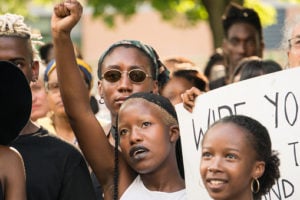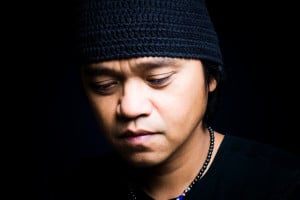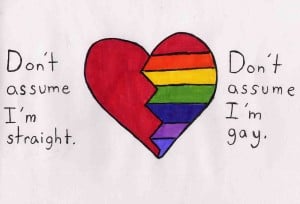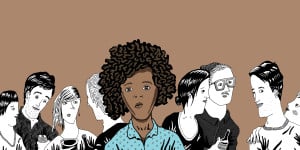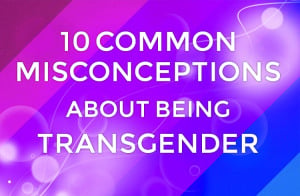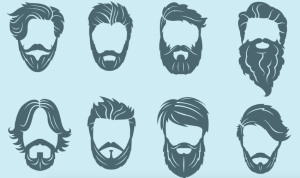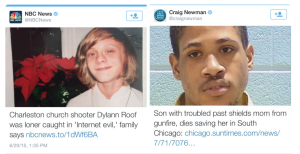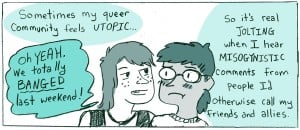
Person forming heart-shape with hands
Trans, gender non-conforming, and non-binary people have not been centered in the LGBTQIA+ movement.
The LGBTQIA+ movement that we witness in television, print media, and in the law is predominantly a white, gay, and masculine movement. However, when one looks behind the scenes, we witness the emotional, physical, and spiritual labor of femmes, people of color, and those who reject the gender binary.
The truth is: The LGBTQIA+ movement could have never come to visibility if it weren’t for the active participation, resistance, resilience, and pushback spearheaded by trans, gender non-conforming, and non-binary leaders of color.
Recently, an active reader of our site commented on our Facebook page. The reader explained that they didn’t know enough trans, gender non-conforming, and non-binary people of color. In fact, the reader expressed that the only leaders they could identify are dead.
This is the invisibility and erasure that I am writing in response to.
It’s not that trans, gender non-conforming, and non-binary people of color haven’t been active in the LGBTQIA+ movement. They have – and they have been silenced.
I’ve fallen into this trap of silencing, too. I am a writer. I write about LGBTQIA+ liberation all the time – and even I have failed in actively naming and recognizing my femmetors and accomplices. I know that this is not my fault. There’s a difference between unintentionally perpetuating systemic violence and being invested in that violence.
As a writer, I have noticed that the two trans, gender non-conforming, and/or non-binary people of color I usually write about are Marsha P. Johnson and Sylvia Rivera. Both of these women are the reason why we now have Pride. These women were ready to push back and fight back against a system that criminalized them on the basis of their melanin, gender, femme aesthetic and politics.
In fact, Marsha P. Johnson and Sylvia Rivera are the founders of Street Transvestite Action Revolutionaries, a collective home housing people who rejected the gender binary and did not have a safe home for those reasons. These two trans women of color spearheaded a movement committed to an intersectional class, gender, racial, and sexual politic of liberation – and they are not the only ones.
Our leaders should not have to die to be recognized.
We need to support our leaders (financially, emotionally, physically, and spiritually) so that they can continue to develop young leadership.
Liberation must not be a commitment to death.
Liberation has always been a commitment to community, kinship, and to a politic of love, resistance, and accountability. Death must no longer be part of this so-called “liberation.”
As someone who is gender non-conforming, Black, and femme, navigating the day-to-day is an accomplishment: I have been denied entering a public bus on the basis of my gender non-conformity; a stranger once came up to me in public and smacked my face to remove lipstick from my lips; I was once chased out of a train by two people on the basis of my femme aesthetic.
Through multiple social media networks, I asked LGBTQIA+ people of color to name trans, gender non-conforming, and non-binary people of color in their community who are resisting, inspiring, and keeping it real.
Because of word count, I will name only seventeen leaders, but this is only a start to the conversation. Because resisting has been a painful everyday experience, practice, and way-of-being, making us all leaders, artists, and visionaries who breathe life into the world daily.
There will be more to come, but for now, learn about these leaders, financially support them, book them, lead next to them, and reach out:
1. Chella Coleman
Chella is a trans, Black, Latinx activist, artist, and educator based in Los Angeles, CA working to address and put an end to chronic homelessness in Skid Row and violence against trans women of color.
She has been an active and outspoken leader against prisons, police brutality, femmephobia, anti-blackness, and misogynoir.
In one of her raw, beautiful, and resilient publications, “Battleground,” Chella kept it real (that’s also a hashtag she started: #ChellaKeepsItReal) and wrote: “I am a warrior, just like my ancestors who fought for me. I am also weak, not knowing where I fit in life. I believe all of these contradictions.”
It is this realness, vulnerability, and strength that I sometimes fail to articulate.
I look to Chella for leadership and femmetorship: She is a sibling who has taught me that contradictory work is liberatory work.
2. D’Loco Kid
D’Lo is a queer/transgender Tamil-Sri Lankan-American actor, writer, rapper, comedian, and teacher whose work centers the stories and narratives of the Desi community, trans of color experiences, and queer liberation.
D’Lo’s performances are both art and medicine in that each performance provides a space of healing, reflection, laughter, and unapologetic realness.
As the creator of the writing workshop “Coming Out, Coming Home,” D’Lo has centered leadership, creativity, and empowerment as tools in which to engage in order to resist the oppressions of transphobia, xenophobia, racism, and widespread displacement.
3. Ola Osaze
Ola is a formerly undocumented Nigerian organizer, artist, and activist based in Oakland, CA. He currently serves as the Development Senior Manager of the Transgender Law Center.
Ola’s leadership has been foundational for the immigrant rights movement, as he is the co-founder of the UndocuBlack emergency fund and Uhuru Wazobia, an African LGBTQIA+ immigrant rights group in New York.
Ola leads, resists, inspires, and keeps it real through his short stories, poetry, and essays where he dares to imagine a world in which trans, Black, immigrant, and gender non-conforming and non-binary people not only survive but thrive!
Without his passion, leadership, and skills, the immigrant rights movement would be at a huge loss without Ola’s magic.
4. Zoey Luna
Zoey is a fifteen-year-old Latinx trans activist based in Los Angeles, CA who advocates for youth who are trans, gender non-conforming, and non-binary by sharing her story of transition and changing her school district’s administration to become trans-inclusive through the Student Success and Opportunity Act.
Zoey has unapologetically spoken about the ways in which educators bully those who are LGBTQIA+, of color, and those who reject the gender binary.
Through her activism and leadership in the education system, healthcare system, and in larger society, she has demanded youth voices in the LGBTQIA+ movement. A documentary about her life was recently released and is accessible for viewing.
5. Ruby Jade Corado
Ruby is a trans-Latina based in Washington, DC, who founded Casa Ruby, which serves as a “Bilingual Multicultural LGBT Organization providing life-saving services and programs to the most vulnerable in the LGBT community.”
Ruby is a survivor of the Salvadoran civil war, and her experiences as a trans woman of color, immigrant, and survivor of war have led her to develop key politics around human rights, immigration equality, and anti-discrimination policy.
Ruby does not only create spaces, but she educates, empowers, and is committed to the leadership of young LGBTQIA+ people across the nation.
6. Dee Dee Ngozi Chamblee
Dee Dee is the founder of La Gender, an organization serving the transgender community residing in the metro-Atlanta area.
Having been at the forefront of transgender rights, HIV decriminalization, and mental health access for over twenty years, Dee Dee was recently honored by the White House as a “Champion of Change.”
As someone who has lived with HIV for over twenty years, Dee Dee’s work has been crucial in advocating for accessible healthcare treatment for poor, LGBTQIA+, and immigrant communities.
She recently spoke in South Africa about the barriers and everyday realities of struggling to receive care and attention as a Black trans woman with HIV.
7. Kay Ulanday Barrett
Kay is a disabled pin@y-american transgender queer residing in New Jersey who mobilizes and educates communities through poetry and public speaking.
He recently published his first book of poetry, When the Chant Comes (2016, Topside Press), which touches on the potential for a feminist masculinity, a more nuanced analysis of disability, and the everyday practice of love and community.
In a PBS interview about his poetry, Kay expressed that poetry is a form of survival because “as a trans person, policy and government do not reflect [his] livelihood or the lives of [his] friends or family. So we have to harvest and cultivate our own stories, not just to feel valid, but to feel rejoiced.”
Kay’s work allows us to see that as marginalized communities, we must not be afraid of our own power, or to articulate our truths in all of their form.
8. Karolina Lopez
Karolina is a trans Afro-Mexican community organizer based in Arizona.
Having been incarcerated for three years and held in solitary confinement at Eloy Detention Center for being trans, Karolina’s life work has been to abolish all prisons and advocate for undocumented trans women seeking political asylum in the United States.
Karolina has been key to the success of many local and national organizations, including Familia: Trans Queer Liberation Movement, the UndocuBlack network, and Mariposas Sin Fronteras.
She is a fearless participant of direct actions, an educator, a public speaker, and an overall powerhouse.
9. Mateo Tabares
Mateo is a formerly undocumented, trans, Colombian organizer based in New York City.
He has been a key leader in the immigrant rights movement, including the #Not1MoreDeportation campaign, the Queer Undocumented Immigrant Project, and Make the Road New York.
Part of Mateo’s leadership has been centering his mother’s story of survival, growth, and acceptance as much as his. Mateo and his mother can be often found speaking together about what it means to be undocumented in the US, the messy work of family acceptance, and a blueprint of resistance that is rooted in compassion and meeting people where they are at.
10. Naomi Fontanos
Naomi is a Filipino trans rights activist and writer who became the first trans co-coordinator of Task Force Pride Philippines (TFP), which served as one of the first spaces in which she began speaking about the erasure of women and trans people from the LGBTQIA+ community.
Her activism has catalyzed a movement not only in the Philippines but across international borders.
In 2012, Naomi Fontanos, Princess Jimenez, Yasmin Lee, and Seanel Caparas founded Gender and Development Advocated (GANDA) Filipinas. GANDA’s mission is to uplift the narratives of trans women in places where they are often left out, such as issues of class, politics, and health.
11. Lourdes Ashley Hunter
Lourdes is the co-founder and Executive Director of Trans Women of Color Collective (TWOCC), whose vision is to build long-term and sustainable trans women of color leadership to advance revolutionary change.
She has been busy writing, organizing, tweeting, and building leadership across the nation.
In a recent Advocate article, Lourdes wrote: “Now is the time for #BlackTransLivesMatter to be more than a trending hashtag. The black trans community can no longer accept broken promises from LGBT/social justice gatekeepers.”
It is from this politic that Lourdes advocates for intersectional liberation rooted in the experiences of Black, disabled, queer, and trans communities.
12. Cayden Mak
Cayden is a trans organizer, academic, visionary, and writer currently serving as the Executive Director of 18 Million Rising, an organization that promotes the civic engagement and leadership of Asian American and Pacific Islanders (AAPI).
Cayden’s knowledge of new media organizing has been critical not only to invoke a conversation about the experiences of the AAPI community but to build a base of intersectional organizing.
For example, Cayden was key in coining the #ELPaso37 hashtag, which skyrocketed a conversation about 37 Punjabi immigrants held in detention centers, connecting struggles between the Sikh community and non-Sikh undocumented immigrants.
13. Rommy Sobrado-Torrico
Rommy is a rockstar visual artist who comes to us by way of Iquique, Chile.
As a trans, undocumented artist, Rommy’s work has reshaped the immigration narrative through visual projects that uplift trans and gender non-conforming communities, domestic workers, climate change, and detention centers.
In an interview with Undocumenting, Rommy states: “I have no idea what a real artist is. All I know is that if you’ve got passion, creativity, and the desire to make things that come from your heart, then you are an artist. That’s real enough for me.”
Their work has appeared in galleries in New York, DC, California, and on online platforms worldwide.
14. Eve Moreno
Eve is a queer trans femme photographer, poet, and essayist based in Los Angeles, CA.
They write about the oppressions that queer and trans people of color face on a daily basis, substance abuse, and reimagining intimacy as a radical form of healing for the body.
Eve is a cultural arts organizer whose photographs have been featured at the Getty Museum, at protests/marches, and on online platforms.
Eve’s vision for liberation includes dismantling the oppressive ways in which photographic technology has been used to dehumanized racialized and gendered bodies. Through this work, Eve prioritizes trans and queer intimacy, resistance, and rejecting the gender binary.
15. Angel Patterson
Angel is a trans and gender non-conforming femme from the Dominican Republic currently surviving, organizing, and transforming in Georgia.
Having lived through solitary confinement as a teenager, Angel’s work centers the narratives, experiences, and hard truths of Black femmes, undocumented immigrants, queer people of color, and people with disabilities.
Angel has spoken about their experiences at college campuses, national gatherings, and on social media, catalyzing discussions about the erasure of undocumented Black immigrants in the US. They are a fierce community leader with SONG and the UndocuBlack Network.
16. Gauri Sawant
Gauris is a trans social activist fighting for queer and trans, sex workers, and womyn’s rights across India.
She is the founder of Sakhi Char Chowghi in Malad, Mumbai, an organization that provides a safe environment for neighborhood residents to talk about issues affecting the LGBTQIA+ community.
Sakhi Char Chowghi’s leadership has grown to a team of over 100 workers and counting. The Mumbai Mirror recently broke the news that Gauris will be building a two-story shelter for the children of sex workers in the next coming year(s).
17. Rev. Lawrence T. Richardson
Rev. Lawrence is a trans and queer identifying ordained minister (United Church of Christ) and writer based in Minnesota working at the intersections of faith and spirituality, LGBTQIA+ liberation, racial and gender justice.
Part of his politics of liberation is that in order to fight for LGBTQIA+ liberation, we need to fight for spaces that are intersectional and invested in developing trans leaders across generations.
His courage and leadership has been crucial in giving LGBTQIA+ people who are religious a framework in which to hold their beliefs and affirm their identities.
***
Trans, gender non-conforming, and non-binary people of color live at the intersections of various oppressions. That means that we must center their leadership because they come to our movements with a knowledge that can teach all of us (LGBTQIA+ or not) a thing or two about resistance.
It is with these seventeen powerful leaders that I ask all of us to reconsider the ways in which we have unintentionally participated in the silencing of trans, gender non-conforming, and non-binary people of color. Once we can name our participation in this system, we will be more apt to develop a liberatory politic that does not interfere with the liberation of our trans, gender non-conforming, and non-binary community.
This is the type of liberation I envision.
[do_widget id=’text-101′]
Alan Pelaez Lopez is a Contributing Writer for Everyday Feminism and an Afro-Indigenous migrant from Oaxaca, Mexico. They write essays, poetry, and non-fiction pieces on Blackness, queerness and immigration. Alan is currently pursuing a PhD in Ethnic Studies and is a member of Familia: Trans, Queer Liberation Movement. Connect via their website, Instagram, Twitter, and check out their jewelry store. Read their articles here.
Search our 3000+ articles!
Read our articles about:
Our online racial justice training
Used by hundreds of universities, non-profits, and businesses.
Click to learn more







